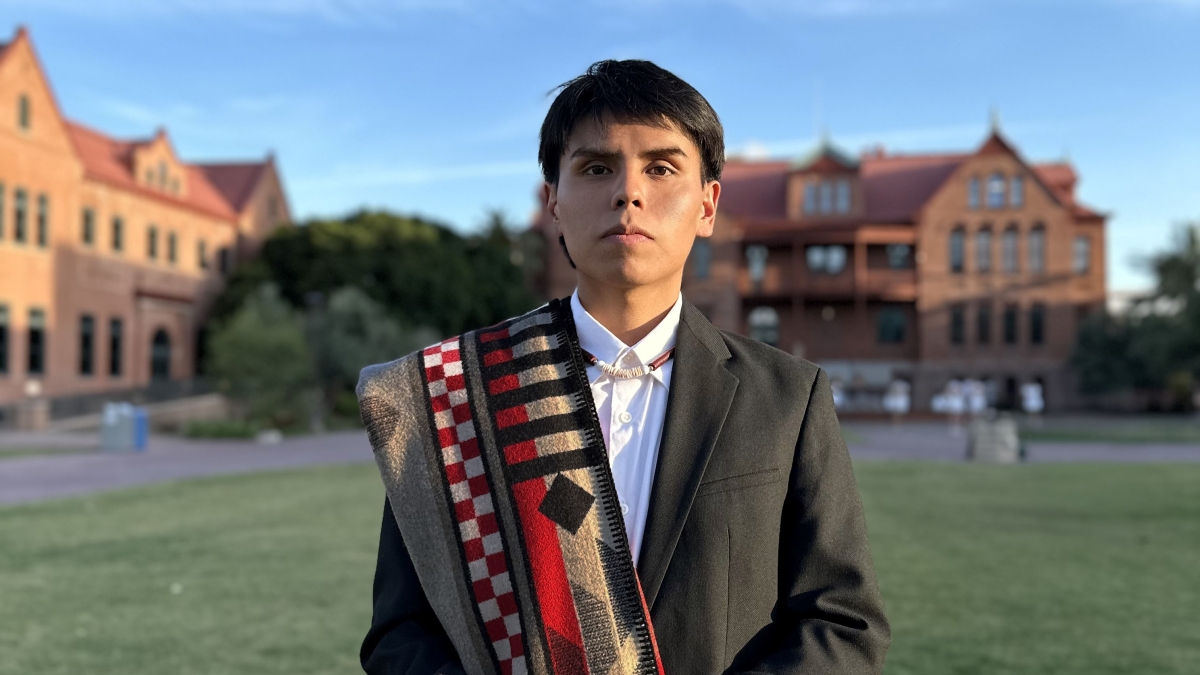
- Details
- By Nicole Greason, ASU News
The Lorraine W. Frank Office of National Scholarships Advisement (ONSA) recently announced that Arizona State University student Ethan Tacheene has been awarded the Udall Undergraduate Scholarship, a major federal fellowship for college sophomores and juniors who demonstrate leadership, public service and commitment to issues related to Native American nations or to the environment. The scholarship provides up to $7,000 for eligible academic expenses and access to the Udall Alumni Network.
“I feel amazing about being chosen as a Udall Scholar. It is something to be very proud of,” said Tacheene, who comes from Many Farms, a small community on the Navajo Nation in northeastern Arizona, where his home had neither running water nor electricity.
Tacheene, a junior business law major and student in Barrett, The Honors College at ASU, is the 42nd ASU student to be named a Udall Undergraduate Scholar since the program began in 1997. He was an honorable mention for the scholarship last year.
“After being an honorable mention, I thought that if I could get the scholarship I would be able to have a stronger voice and be a better representative of my people and show that it’s possible to try again and succeed,” he said.
Tacheene is among 55 Udall Scholars from throughout the nation selected in 2024. Madison Eklund, a sophomore conservation biology and ecology major and Barrett Honors College student, was an honorable mention this year.
Tacheene, who is interested in tribal law and policy, as well as the economies of small, rural communities like his hometown, said scholarships have been fundamental to him being able to get into and stay at ASU.
“I have spent most of my time wondering how I was going to be able to afford school and how I was going to be able to live a life different than the one in my hometown,” said Tacheene, who in addition to the Udall Scholarship has received the Obama and the Chief Manuelito scholarships and was a Flinn Scholarship semifinalist.
He has served as chief operations officer for the Native American Business Organization at ASU, and has been active in the Office of American Indian Initiatives and the Alliance of Indigenous Peoples.
Tacheene has advised Barrett Honors College about ways to encourage Native American students to enroll at ASU and has assisted high school students in his hometown with applications for admission, scholarships and financial aid. His honors thesis is a comprehensive study of the Navajo Nation’s contemporary economic landscape and formulation of strategic initiatives aimed at promoting economic growth and advancement.
Tacheene said he wants to learn as much as he can about business and law in order “to take it back to where I came from and try to see if I can find ways to open doors for people — students and future generations — so they can be able to attend school, learn as I have learned and to understand that it is possible to grow and become greater.”
His ultimate goals are to attend law school, practice corporate law and eventually establish his own law firm where he’ll employ Native Americans.
This year’s 55 Udall Scholars, from 50 colleges and universities, will connect Aug. 6–10 at the annual Udall Scholar Orientation, where they’ll meet one another and program alumni, learn more about the Udall legacy of public service, and interact with community leaders in environmental fields, tribal health care and governance.
The Udall Scholarship is a program of the Morris K. Udall and Stewart L. Udall Foundation, known as the Udall Foundation. The foundation was established by the U.S. Congress to honor Arizona Rep. Morris K. Udall's lasting impact on the nation's environment, public lands and natural resources and his support of the rights and self-governance of American Indians and Alaska Natives. In 2009, the foundation’s name was amended to include Stewart Udall, who served as U.S. Secretary of the Interior from 1961 to 1969.
The award is open to full-time sophomores and juniors at any accredited academic institution in the U.S.
Students may apply in one of three areas: tribal policy, Native health care or environment. Those who apply in the policy or health care categories must be Native Americans or Alaska Natives.
Applicants for the Udall Scholarship must be nominated by their institution, and each college or university is limited in the number of students that it may nominate.
At ASU, the application process is managed through ONSA, which organizes a faculty committee to review and approve applications for nomination. ONSA collaborates with many ASU units, including the School of Sustainability and American Indian Student Support Services to identify and prepare candidates for the Udall Scholarship.
ASU students who are interested in applying for the Udall Scholarship in a future cycle can visit onsa.asu.edu to schedule an advising meeting.
Help us defend tribal sovereignty.
At Native News Online, our mission is rooted in telling the stories that strengthen sovereignty and uplift Indigenous voices — not just at year’s end, but every single day.
Because of your generosity last year, we were able to keep our reporters on the ground in tribal communities, at national gatherings and in the halls of Congress — covering the issues that matter most to Indian Country: sovereignty, culture, education, health and economic opportunity.
That support sustained us through a tough year in 2025. Now, as we look to the year ahead, we need your help right now to ensure warrior journalism remains strong — reporting that defends tribal sovereignty, amplifies Native truth, and holds power accountable.
 The stakes couldn't be higher. Your support keeps Native voices heard, Native stories told and Native sovereignty defended.
The stakes couldn't be higher. Your support keeps Native voices heard, Native stories told and Native sovereignty defended.
Stand with Warrior Journalism today.
Levi Rickert (Potawatomi), Editor & Publisher

